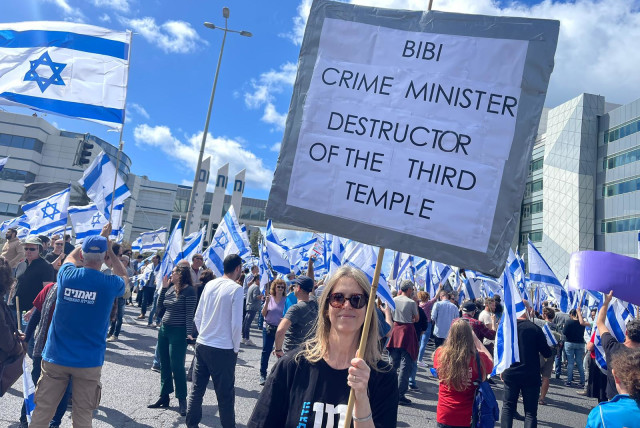Israel's diverse protesters can't be labeled as anti-Jewish state - opinion

Douglas Altabef, chairman of the board of Im Tirtzu, has figured out, by himself, that the protesters are “new Jews who know nothing of their own tradition.” He has no way of knowing this factually.
There seems to be an ongoing need to define Israeli protesters, who are still making their presence felt on the streets of our nation week after week. Probably the most repeated protester label, both from the media and outsiders, whose main source of information is what they hear and read, has been “left-wingers.” Others have said it’s well-funded organizers, who are behind the protests, bringing out anarchists to wreak havoc in our country. Now someone else has weighed in on defining who the protesters really are.
Douglas Altabef, chairman of the board of Im Tirtzu, has figured out, by himself, that the protesters are “new Jews who know nothing of their own tradition.” They are those who “received no Jewish education and were raised with contempt for the Jewish religion as an old-world vestige that only succeeded in contributing to the marginalization and oppression of Jews.” (“There is no ‘either/or,’” August 28, 2023)
It’s amazing how Altabef found the time to write his article because it must have taken him many months to interview each protester in order to come to his conclusion that every single one of them, who number into the hundreds of thousands (or even into the millions, if you consider the aggregate), are Jews whose problem is their lack of Jewish knowledge, history, context, and education. These are the missing elements that he claims make them angry and unappreciative of the sacrifices made by prior generations who defended future ones.
Why it is wrong to consider all protesters as one group of secular Jews
The supposition is stunning because if ever there was a more diverse group of individuals found in one place, it is definitely Israel’s weekly protesters who make up a broad tapestry of languages, cultures, education, religious convictions, and political leanings. Among these protesters are left-wingers, right-wingers, centrists, secular, religious, and much more.
They make up a wide variety of ages and come from a multiplicity of diverse families, including those who have, indeed, studied in Jewish institutions of learning, know the history of their people well, and are even probably able to extemporaneously lecture on the topic of Jewish life and thought at any university.
Yet, the assumption is that those on the street are a monolithic group, all coming from the same background, one without a strong Jewish identity, because if they had one, they wouldn’t possibly be questioning the direction in which the present government aspires to take us all.
The writer says that older Israelis have “anointed the Supreme Court as their saviors” which he claims is a mistake since “the court has become a tainted institution bloated with its own oligarchic omnipotence.”
Well, that’s definitely one way to look at it, but there is also another viewpoint worth considering. While the judicial system may not be perfect, neither is a coalition comprised of one voice.
WHEN A government coalition is built upon all of its members expressing nearly the same religious, political, and cultural opinions, there is no room for those who don’t share those positions. In this case, that adds up to several million citizens who, although they identify as traditional, observe the holidays and Friday nights and our shared cultural and historical events, do not agree that the law should dictate how we live and what we believe.
For them, how Jewishness is defined, what we teach our children and grandchildren, as well as the things we eat and how we dress, should be left up to the individual. Allowing us to make our own choices scarcely makes us less appreciative of our past or indifferent to our future survival as a people and a nation.
The Jewish homeland is a complexity of opinions, beliefs, expressions, and lifestyles, and to suggest that freedom, in some way, threatens our existence or shared identity is an argument for controlling others by not allowing them to decide what constitutes the Jewish experience for them.
Altabef laments those who don’t see things through his particular lens, defining us as “bereft of an awareness of ourselves.” Well, here’s a news flash. We are aware of ourselves and our homeland. It is specifically because of our history, where we were often forced to embrace someone else’s convictions, that we are now doing all we can to retain a tight grip on individual freedoms that favor independent discretion – while strengthening the group as a whole.
In fact, it is out of a sense of loyalty and deep appreciation of our forebears, who gave up so much so that we could live the dream of returning to Zion from our captivity that we, all the more, value the preservation of freedom from bondage.
The fact that a one-voice group cannot see that, already speaks volumes for their own insecurity which tells them that in order to ensure our Jewish legacy, we must all think, feel, and act the same way. Nothing could be further from the truth.
Right now, in our beloved Israel, there is an amalgamation of kashrut observant folks along with shrimp and pork-eating secular Israelis. What are we to do, expel the latter group from their homeland, because they pose an existential threat to the continuity of a Jewish country?
Here’s a great idea! Why don’t we leave it up to the Almighty, without whom we wouldn’t even be having this argument – because if He is the one who made this dream possible then He is also the one who will make sure it continues,despite all odds.
Judaism acknowledges that we were created with free will, and as dangerous as that is, it was the Creator’s belief that anything less would be wrong. So, when it comes to the future of the Jewish homeland, we might all do well to take a lesson from the same God who wanted us to come to Him in a way that was not forced, but rather out of a personal choice fueled by sincerity.
If the Creator can risk that when it comes to His creation, why can’t we when it comes to one another?
The writer is a former Jerusalem elementary and middle school principal. She is also the author of Mistake-Proof Parenting, available on Amazon, based on the time-tested wisdom found in the Book of Proverbs.
Jerusalem Post Store
`; document.getElementById("linkPremium").innerHTML = cont; var divWithLink = document.getElementById("premium-link"); if (divWithLink !== null && divWithLink !== 'undefined') { divWithLink.style.border = "solid 1px #cb0f3e"; divWithLink.style.textAlign = "center"; divWithLink.style.marginBottom = "15px"; divWithLink.style.marginTop = "15px"; divWithLink.style.width = "100%"; divWithLink.style.backgroundColor = "#122952"; divWithLink.style.color = "#ffffff"; divWithLink.style.lineHeight = "1.5"; } } (function (v, i) { });

